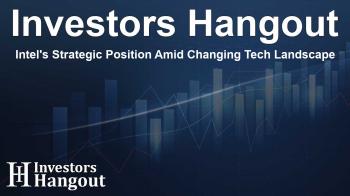Intel's Strategic Position Amid Changing Tech Landscape

Intel's Recent Stock Movements and Political Influence
Recently, Intel (NASDAQ: INTC) has seen significant stock activity, driven in part by political dynamics rather than just its earnings performance. The narrative surrounding CEO Lip-Bu Tan has taken twists akin to those of high-profile political figures, particularly during interactions with leaders that affect market perceptions. These events have raised eyebrows and sparked discussions about the future of Intel in a competitive landscape.
Understanding Intel's Role in the Technological Ecosystem
As a pivotal player in the global tech arena, Intel's journey involves more than just product advancements. The current geopolitical scenarios emphasize a need for strength in technology sectors, particularly as nations work towards securing their technological bases. The dominance of US-based tech firms highlights not only their innovations but also their integration within the wider global framework.
Recent studies indicate that a significant percentage of European companies rely heavily on US technology services. This dependency underscores Intel's critical role and responsibility in maintaining a stable supply of cutting-edge technology, crucial for sustaining overall economic and strategic advantages.
The Geopolitical Landscape and Its Impact on Intel
Amidst these developments, the recognition of Taiwan's strategic significance has emerged clearly, especially due to its robust semiconductor sector, notably represented by TSMC. This relationship between geopolitical considerations and corporate strategies reveals how entwined these dynamics are for companies like Intel, which must navigate potential threats to their operations and market positions.
Intel introduced its IDM 2.0 strategy aimed at enhancing its manufacturing capabilities and reestablishing its status as a top-tier chip producer. However, this ambitious blueprint faces hurdles, including intense competition and the financial strains of necessary investments.
Challenges and Opportunities in Chip Production
Intel's continued push to innovate amid fierce competition from TSMC and AMD reflects both its challenges and its commitment to maintaining relevance in the semiconductor industry. These competitors have made strides that require Intel to reassess its strategies while ensuring productivity boosts and quality improvements in their manufacturing processes.
The need for a reliable and advanced chip production capability has led to investments and partnerships aimed at consolidating resources and expertise. Recent investments from major firms signify a robust confidence in the future of domestic chip production and align with broader economic objectives.
The Role of Partnerships in Intel’s Growth
Strategic partnerships, such as the substantial investment from SoftBank, indicate a shift towards greater collaboration in the tech sector. This influx of capital is not only essential for Intel’s growth but also highlights a trend towards concerted efforts in building a resilient tech infrastructure in the U.S.
Maintaining synergistic relationships with partners like TSMC while developing its own production capabilities will be essential. Intel aims for success in upcoming chip release cycles, which could significantly boost market confidence and stabilize its stock valuations.
Future Prospects for Intel
In summary, Intel's trajectory hinges on its ability to adapt to the complexities of the modern tech landscape while navigating political currents. Recent actions from political figures hint at a recognition of Intel's crucial role in the semiconductor industry, particularly in the context of U.S. technological independence.
As the tension between major global players continues, Intel's involvement in producing chips on American soil is not just a corporate endeavor but a national priority. The complexity and scale of this task will necessitate ongoing adjustments, yet Intel's potential to emerge stronger remains a focal point for investors and industry observers alike.
Frequently Asked Questions
What is the current state of Intel’s stock?
Intel's stock has seen fluctuations influenced by political statements and its strategic position within the tech industry.
How does geopolitical tension affect tech companies like Intel?
Geopolitical issues can create opportunities and challenges that directly impact the operations and market confidence of tech firms like Intel.
What strategies is Intel employing to enhance its market position?
Intel is implementing its IDM 2.0 strategy, investing in manufacturing capabilities and enhancing partnerships to improve its competitiveness.
Why is TSMC significant to Intel?
TSMC plays a key role in the semiconductor landscape, impacting Intel's production strategies and market positioning.
What does the future hold for Intel?
Intel's future may involve increased collaboration and investment aimed at solidifying its role as a leading chip producer in a competitive global market.
About The Author
Contact Logan Wright privately here. Or send an email with ATTN: Logan Wright as the subject to contact@investorshangout.com.
About Investors Hangout
Investors Hangout is a leading online stock forum for financial discussion and learning, offering a wide range of free tools and resources. It draws in traders of all levels, who exchange market knowledge, investigate trading tactics, and keep an eye on industry developments in real time. Featuring financial articles, stock message boards, quotes, charts, company profiles, and live news updates. Through cooperative learning and a wealth of informational resources, it helps users from novices creating their first portfolios to experts honing their techniques. Join Investors Hangout today: https://investorshangout.com/
The content of this article is based on factual, publicly available information and does not represent legal, financial, or investment advice. Investors Hangout does not offer financial advice, and the author is not a licensed financial advisor. Consult a qualified advisor before making any financial or investment decisions based on this article. This article should not be considered advice to purchase, sell, or hold any securities or other investments. If any of the material provided here is inaccurate, please contact us for corrections.

